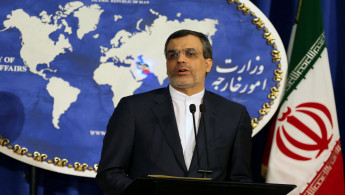Iran: US court ruling on Beirut bombing is 'theft'
Iran on Thursday rejected a ruling by the US Supreme Court the day before the decision clears the way for families of victims of the 1983 Marine barracks bombing in Beirut and other attacks linked to Iran to collect nearly $2 billion in frozen Iranian funds.
The state IRNA news agency quoted the spokesman of Iran's foreign ministry, Hossein Jaberi Ansari, as saying that "such a verdict is a theft of the assets and properties of the Islamic Republic of Iran."
From the United Nations, Ansari spoke to IRNA and said the ruling is "tantamount to ridiculing justice and law and it does not create any right for the US nationals."
He added that Iran considers the US government responsible for compensating any damages that Iran might incur from the verdict.
The US court's ruling directly affects more than 1,300 relatives of victims, some who have been seeking compensation for more than 30 years.
They include families of the 241 US service members who died in the Beirut bombing.
Iran denies any links to the attacks and has said it had no role in the deadly events in the Lebanese capital.
Ansari said the verdict also shows Washington is still under the influence of Israel and that such hostile action against Tehran "only adds to the growing and intense mistrust of US policies by the Iranian government and nation."
 |
The court's decision comes as the long-term foes hope for better relations after a nuclear deal between Iran, the United States and five other major powers was agreed last year. |  |
The Supreme Court case involved $1.75 billion in bonds, plus accumulating interest, owned by Iran's central bank, or Bank Markazi, held by Citibank in New York.
The plaintiffs in the lawsuit included relatives of the victims of the Marine barracks bombing in Beirut, the 1996 bombing of the Khobar Towers in Saudi Arabia that killed 19 US service members, and other attacks that were carried out by groups with alleged links to Iran.
The lead plaintiff is Deborah Peterson, whose brother, Lance Cpl. James C. Knipple, was killed in Beirut.
Iran's Bank Markazi complained that Congress was intruding into the business of federal courts when it passed a 2012 law that specifically directs that the banks' assets in the United States be turned over to the families of the victims.
President Barack Obama issued an executive order in 2012, freezing the Iranian central bank's assets in the United States.
The court's decision comes as the long-term foes hope for better relations after a nuclear deal between Iran, the United States and five other major powers was agreed last year.
It also coincides with a controversial draft bill - expected to be debated by the US congress - which could allow families of the 11 September 2011 attacks to sue the Saudi government in US courts for its alleged link to the attack that left nearly 3,000 people dead.





 Follow the Middle East's top stories in English at The New Arab on Google News
Follow the Middle East's top stories in English at The New Arab on Google News

![MP Essam Diab's pursuit to block TikTok in Egypt has revived an already ongoing debate in the country. [Getty]](/sites/default/files/styles/image_330x185/public/1230748046.jpeg?h=a5f2f23a&itok=-8MqBLLC)
